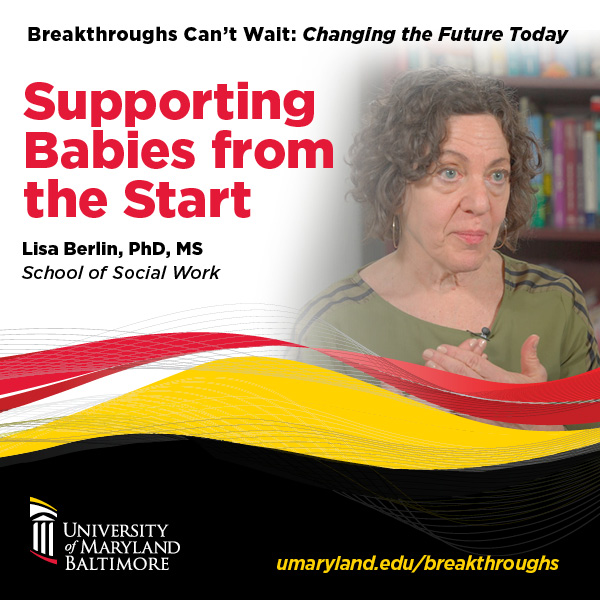Breakthroughs Can’t Wait: Supporting Babies from the Start
April 30, 2025 UMB Office of Communications and Public Affairs
The School of Social Work’s Lisa Berlin, PhD, MS, is studying how a brief, home-based parenting program can make a measurable difference in children’s health and development.
At the University of Maryland, Baltimore (UMB), groundbreaking discoveries happen every day — transforming medicine, improving health, and shaping the future. From changing legal policy to pioneering treatments to cutting-edge scientific breakthroughs, UMB researchers are tackling real-world challenges and making a lasting impact on lives everywhere.
In our “Breakthroughs Can’t Wait: Changing the Future Today” series of videos, we will dive into inspiring stories of innovation from across UMB’s seven schools. See how scientists, doctors, and experts are addressing today’s most pressing issues — fueled by the critical support of government funding that drives progress forward.
Supporting Babies from the Start
What if one of the most powerful tools for a baby’s lifelong health wasn’t a treatment or a test, but a caregiver’s touch?
That’s the focus of the work Lisa Berlin, PhD, MS, is doing at the University of Maryland, Baltimore. The Alison L. Richman Professor of Children and Families at the University of Maryland School of Social Work and expert in early child-caregiver attachment, Berlin is studying how a brief, home-based parenting program can make a measurable difference in children’s health and development. Her research is supported by the National Institutes of Health.
Berlin’s study centers on the Attachment and Biobehavioral Catch-Up (ABC) program, in which trained parent coaches guide caregivers through nurturing, science-backed interactions with their babies. In 10 sessions, the program aims to strengthen early attachment relationships — building a foundation for emotional, cognitive, and even physical well-being.
“Babies develop 1 million new neural connections per second. Those neural connections develop the growing brain architecture,” Berlin said. “Brain architecture guides all aspects of human behavior — how we relate to each other, socially, emotionally, how we are able to pay attention in school and elsewhere — and it guides our developing immune systems, so our long-term physical health.”
Watch the video Q&A below as Berlin shares how her team is studying the ABC program’s impact on families, including improvements in sleep, weight regulation, and immune health.